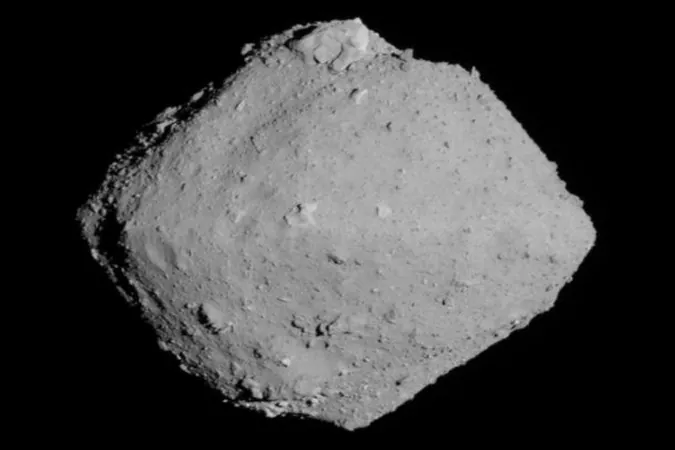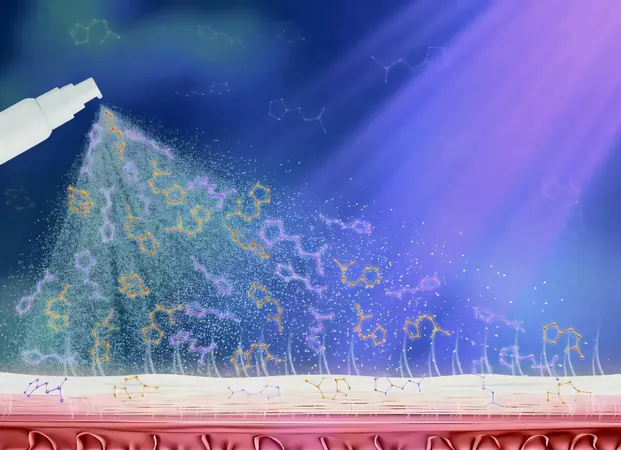
Scientists Stunned as Microorganisms Disrupt Pristine Asteroid Sample from Ryugu!
2024-11-23
Author: William
Introduction
In an unprecedented twist, researchers have uncovered signs of microbial life in what was meant to be the untouched samples of asteroid Ryugu, collected by Japan's Hayabusa2 mission in 2019. This shocking revelation raises questions about the effectiveness of current procedures to prevent earthly contamination, as the findings reveal that scientists may have underestimated the risks involved in handling space materials.
Groundbreaking Study
Imperial College London led a groundbreaking study that discovered a variety of microorganisms in the Ryugu samples, pointing to terrestrial origins. This suggests that even with stringent protocols in place to protect samples retrieved directly from space, contamination has still occurred. The detailed findings were published in the journal *Meteoritics and Planetary Science*.
Unique Collection Methods
Unlike traditional studies involving meteorites—space rocks that have already plummeted through Earth’s atmosphere and been subjected to environmental exposure—missions like Hayabusa2 and NASA's OSIRIS-REx have the unique advantage of collecting asteroid material directly from the cosmos. These samples, gathered in pristine conditions, were hoped to offer scientists a chance to study the materials without the influences of Earthly contaminants.
Hayabusa2 Mission Details
The Hayabusa2 mission successfully collected approximately 5.4 grams (roughly a teaspoon) of rock, dust, and pebbles from Ryugu, situated nearly 200 million miles away from our planet. After a meticulous landing in South Australia in 2020, the samples were transported to a specialized facility in Sagamihara, Japan. There, they underwent intense quarantine measures, including being opened in a vacuum room and stored in nitrogen-filled containers designed to repel earthly bacteria.
Unexpected Discoveries
Despite these precautions, upon examining their samples, researchers detected unexpected rods and filaments that were identified as thread-like microorganisms. The fact that these biological entities originated from Earth, rather than from Ryugu itself, raises significant concerns about the reliability of contamination prevention measures in future extraterrestrial sample returns.
Comparison with NASA's OSIRIS-REx
Interestingly, NASA's recent recovery of samples from the asteroid Bennu, which was completed in 2023, adhered to similar stringent protocols. Fortunately, up to this point, no signs of earthly bacteria have been reported from those specimens.
Implications for Future Missions
Asteroid Ryugu falls into the category of carbonaceous asteroids, believed to be the fundamental building blocks of our solar system. Studying these materials provides essential clues about the formation of the solar system and the evolution of life on Earth. Previous analyses of Ryugu’s samples revealed organic molecules, indicating that critical ingredients for life may have arrived on Earth through such asteroid interactions.
Conclusion
These sample return missions present an incredible opportunity for scientific discovery, yet the challenges of ensuring purity continue to pose risks. As scientists delve deeper into the mysteries of our solar system, the need for robust contamination prevention protocols is more pressing than ever. Will future missions overcome these obstacles? Only time will tell. Stay tuned for more incredible discoveries from the final frontier!









 Brasil (PT)
Brasil (PT)
 Canada (EN)
Canada (EN)
 Chile (ES)
Chile (ES)
 España (ES)
España (ES)
 France (FR)
France (FR)
 Hong Kong (EN)
Hong Kong (EN)
 Italia (IT)
Italia (IT)
 日本 (JA)
日本 (JA)
 Magyarország (HU)
Magyarország (HU)
 Norge (NO)
Norge (NO)
 Polska (PL)
Polska (PL)
 Schweiz (DE)
Schweiz (DE)
 Singapore (EN)
Singapore (EN)
 Sverige (SV)
Sverige (SV)
 Suomi (FI)
Suomi (FI)
 Türkiye (TR)
Türkiye (TR)